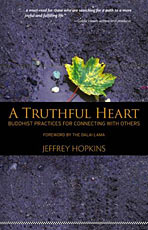Jeffrey Hopkins served as the chief interpreter to the Dalai Lama for a decade. A Buddhist scholar-practitioner and author of more than 25 books and translations, he is Professor of Tibetan and Buddhist Studies at the University of Virginia, where he founded the largest academic program of Tibetan Buddhism studies in the West.
"We all want happiness and do not want suffering" is an observation the Dalai Lama uses regularly in his books and oral teachings. Hopkins really clarifies the depth behind these simple words. His explanations and illustrations are very accessible, making this book a most useful introduction to compassion practices.
The first step in cultivating compassion is equanimity or even-mindedness. Everyone equally yearns to have happiness and avoid suffering. Hopkins hammers this down with the following illustration: "When you have a headache and want to get rid of it, imagine that it's the same for everyone. There isn't anyone who deliberately wants more headache."
The practice of even-mindedness is expanded further as we give up the "me first" approach to others and realize how much we have in common with them. For instance, we can feel the oneness with our friends and then expand that sentiment to neutral people (clerks in stores, strangers on the streets) and even to our enemies.
Of course, the practice of compassion goes against the ego and our ordinary habits of exclusion. Hopkins presents another exercise that consists of imagining radiating rays of ambrosia streaming from our hearts to others. A difficult practice involves rejoicing with the success of others — even the difficult people in our lives. Hopkins also covers ways to remove barriers to equanimity and compassion.
A Truthful Heart is a resource that can help tear down the walls of separation between us and those we ignore or denegrate as the dangerous, untrustworthy other. Here is a smorgasbord of eminently practical material designed to enable us to honor how similar we are to others.
